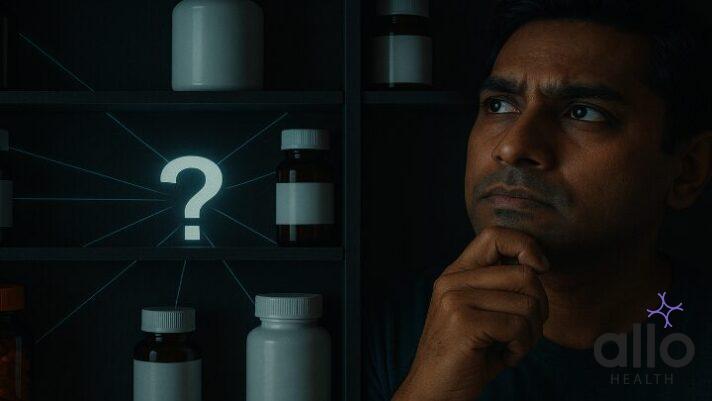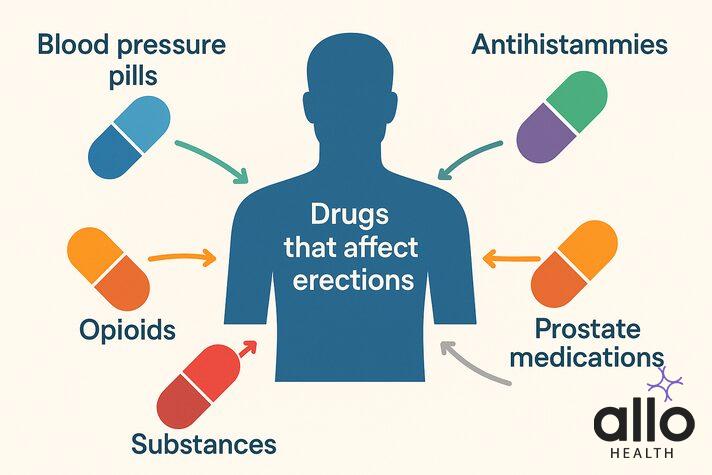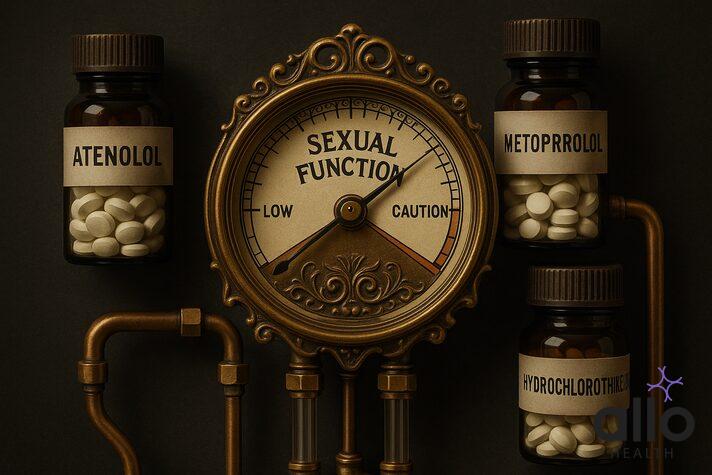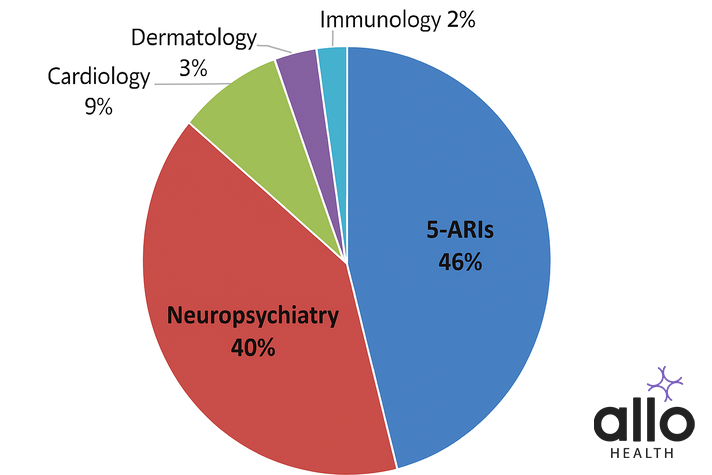Medications and Drugs that Can Affect Erections or Cause ED

Certain medications can cause or worsen erectile dysfunction (ED), including common drugs for mental health, blood pressure, allergies, cancer, and pain relief. Antidepressants, blood pressure medicines like beta-blockers and diuretics, antihistamines, opioids, and some prostate treatments are often linked to ED by affecting blood flow, hormones, or nerve signals. Not everyone experiences these side effects, and sometimes ED improves when medications are changed or stopped under medical supervision. If you suspect your medication is affecting your sexual health, talk to your doctor. They can help identify the cause and suggest safe alternatives or treatments.
Drugs that cause ED might be hiding in your daily routine, and most men don’t even realize it. From blood pressure pills, anti-allergy medications, to antidepressants and prostate drugs, many common medications can quietly interfere with your sexual activity. They may reduce blood flow, alter hormone levels, or disrupt brain-to-penis signaling. The good news? If your medication is the problem, there are ways to address it without sacrificing your overall health.
In this article, we’ll break down which drug categories are most likely to cause ED, their side effects for sexual arousal, how they affect your body, and when it’s time to talk to your doctor.
What Are The Drugs That Cause Erectile Dysfunction?
Who can think that the medications you take for some physical, mental, or metabolic reasons can interfere with your sexual desire? But this is the harsh reality of some drugs. These medications do this by interfering with your blood flow, hormones, and brain chemistry. The most likely drugs to cause erectile dysfunction are:
- Blood pressure medications
- Antiallergic or antihistamine medicines
- Antidepressants and antipsychotic drugs: Antidepressant drugs can cause problems in sexual function, probably by blocking the action of three brain chemicals that convey signals between nerve cells of the brain and penis: acetylcholine, serotonin, and norepinephrine.
- Prostate and hormonal medications
- Opioids (painkillers) and some chemotherapy drugs
- Substance and drug abuse

Now that we have a brief look at what drugs cause a man not to get hard, we will now dive into knowing how these drugs do this.
Blood Pressure Medications And Erectile Dysfunction
High blood pressure medications are among the most common causes of drugs that cause ED. Beta-blockers and diuretics have been shown to have the strongest links between their use and erectile dysfunction. A study of 20,000 Danish men showed a clear association between thiazides, calcium channel blockers, and ACE inhibitors, and their use is associated with erectile dysfunction [1]. Some of these common blood pressure medications associated with erectile dysfunction include:
- Beta-blockers (like atenolol and metoprolol)
- Thiazide diuretics (like hydrochlorothiazide)
- Calcium channel blockers and ACE inhibitors

Antidepressants That May Lead to Erectile Problems
Antidepressants, particularly SSRIs (selective serotonin reuptake inhibitors) like fluoxetine (Prozac) and sertraline (Zoloft), are commonly linked to reduced libido and erectile difficulties. These drugs can cause problems in sexual function, probably by blocking the action of three brain chemicals that convey signals between nerve cells of the brain and penis: acetylcholine, serotonin, and norepinephrine.
A survey of 20 drugs that can cause ED was conducted. This study showed that these neuropsychiatric medicines are considered to account for 40% of erectile dysfunction cases [2]. The other most likely drugs to cause erectile dysfunction, along with this category, include the following mentioned in the table below-

Prostate and Hormone-Related Medications, Which Can Cause ED
Some drugs are commonly used to treat an enlarged prostate and baldness in men. These medications work by blocking the conversion of testosterone to its more active form, called dihydrotestosterone (DHT). While helpful for prostate and hair-related issues, research shows that long-term use, especially in younger men, can increase the risk of persistent erectile dysfunction [3]. Most of these drugs are finasteride and dutasteride (5-alpha reductase inhibitors)
Antihistamines and Allergy Drugs Affecting Sexual Dysfunction
This class of drugs is used to treat allergies and allergy-related conditions. Antihistamine drugs like diphenhydramine (Benadryl) and drugs like cimetidine (Tagamet, for ulcers) can also interfere with sexual function by reducing the smooth muscle response and lowering the testosterone levels. Some antihistamines can also tighten the blood vessels, which makes it harder for the penis to relax and fill with blood for an erection [4].
Opioids and Chemotherapy Drugs That Cause Erection Problems
Medications like Opioids (painkillers) [5] and some chemotherapy drugs [6] can suppress testosterone over time and damage blood vessels. This lower testosterone and disturbances with blood vessels can impact sexual function over time and can lead to erectile dysfunction
Substances and Recreational Drugs That Can Cause ED
Consumption of some substances like alcohol, tobacco and recreational drugs like marijuana, cocaine, and heroin can also affect sexual dysfunction. The relationship between alcohol, marijuana, cocaine, and erectile dysfunction is real, and it can worsen your sexual life.
When Should You Seek Help For Drug-Induced Erectile Dysfunction?
If you feel that you are having trouble with erections and it could be because of the medications you are taking. You do not need to stop any medication on your own, without first speaking to your doctor. You should try following the steps mentioned below.
You can maintain a record of the medications you consume. These could involve prescription medicines, over-the-counter medicines, or even some herbal medicines.
Note down all the symptoms you started feeling in the bedroom after you started taking these drugs.
- Discuss any timing around when the ED started, especially after starting a new drug.
- Ask about lower-risk alternatives or dosage adjustments.
- Go to a healthcare professional, as they may help you clear your doubts if your medication is causing problems in your sexual life.
- It is always better to consult a healthcare professional because they can offer you a set of prescription medicines for erectile dysfunction, alternatives to the medications you are taking, and some lifestyle-changing remedies that may help.
If you notice changes in your sexual desire and function after starting a new medication, don’t panic and don’t stop the medicine on your own. Talk to your doctor. In many cases, a small adjustment with some treatment options can make a big difference.
ED Caused by Medication Is Manageable
Many men don’t realize that everyday medications like those for blood pressure, depression, prostate issues, or allergies can quietly contribute to erectile dysfunction. But here’s the good news: ED caused by medications is often reversible. With the right medical support, lifestyle changes, or alternative treatment plans, you can restore your sexual health. Don’t ignore the signs. Always talk to your doctor, review your medications, and take control of your well-being. Erectile dysfunction may feel overwhelming, but with the right steps, it’s a problem that can be managed.
"The following blog article provides general information and insights on various topics. However, it is important to note that the information presented is not intended as professional advice in any specific field or area. The content of this blog is for general educational and informational purposes only.
Book consultation
The content should not be interpreted as endorsement, recommendation, or guarantee of any product, service, or information mentioned. Readers are solely responsible for the decisions and actions they take based on the information provided in this blog. It is essential to exercise individual judgment, critical thinking, and personal responsibility when applying or implementing any information or suggestions discussed in the blog."






